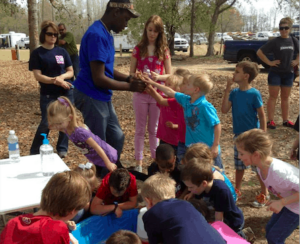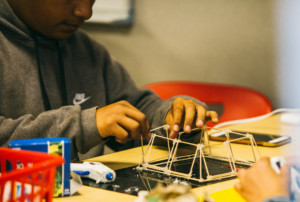A Purpose Proposal: Entrepreneurial Thinking and Sustainability Must Be Core Components of Pathways
Key Points
-
As the world scrambles to find solutions to the damage we’ve caused to our people and planet, one thing seems certain – human ingenuity is essential to rethinking systems and finding alternative ways of doing things.
-
This requires skills beyond problem-solving.

Entrepreneurship as a Pathway
As the waves of change lose their longevity, one might wonder why we’re already talking about the next industrial revolution when it seems we just entered into a new one. Well, it’s because Industry 5.0 is an urgent and necessary complement to the world of work, one in which purpose is sought with profits, and companies are expected to be a part of the solutions our societies seek. The work-based learning pathways that incorporate apprenticeships and mentorship leading to family-sustaining wages should also include opportunities to develop entrepreneurial thinking and sustainability elements critical to a thriving and regenerative economic ecosystem.
As the world scrambles to find solutions to the damage we’ve caused to our people and planet, one thing seems certain – human ingenuity is essential to rethinking systems and finding alternative ways of doing things. This requires skills beyond problem-solving. It requires complex thinking, problem-finding, understanding interdependency and systems…basically, we need innovation with purpose. As Zoe Weil would say, we need solutionaries. By intentionally including traditional entrepreneurial skills such as leadership, design thinking, finance, marketing, and creativity into any pathways program, learners develop agency to not only earn a family-sustaining wage but potentially build opportunities for others (and themselves) in the future.
That being said, this is a two-way road. Many schools and programs around the world are doing a great job at instilling some of the above skills but without creating scaffolding, supports or pathways for their learners. This is a huge missed opportunity for both our people and our planet.
The Opportunity of Social Entrepreneurship
The idea of social entrepreneurship started to gain recognition around the 1980s and has since gained momentum globally. Social entrepreneurship bridges the mission-driven approach of the non-profit with the quest for sustainable revenue streams of a for-profit. At its core, it is a business with a purpose to generate a positive impact for society – or the environment- through its products or services. It is an essential model in a world where nonprofits compete for a limited pool of funds.
In places where it is easier for companies and individuals to register as a mission-driven organization, data tells us that the opportunity is there. For instance, in the European Union the social economy equates to about 8% GDP and 13.6 million jobs. In the U.K., the social economy adds about £60 billion to its economy. As we search for data – or the lack thereof -on the social economy in the U.S. we can only wonder if we might do more to fuel human ingenuity and drive us out of this for-profit versus non-profit dichotomy that prevents us from unlocking the potential of our own social economy. Perhaps by exposing students to the field of social entrepreneurship we do more to support Industry 5.0 in which students are generating wealth while also solving problems and adding value to society.
There is no better practice field than schools for nurturing entrepreneurial skills, ideas and talents which is why we must find ways to embed sustainability into what we are already doing. Not only does this better equip our youth for jobs of the future, but they understand that sustainability isn’t just about doing good – there’s also opportunity in doing good. Purpose and profits are not necessarily combat against one another as the usual rhetoric might portray. Infusing “purpose” behind existing pathways that exist in our schools is one of the most practical ways to facilitate the rise of social business as a pathway. Many schools are already doing great work.
University Charter School
Entrepreneurship programs at the secondary level are numerous and traditionally have fallen into business tracks. School programs that deliver on a purpose mindset and entrepreneurial mindset take traditional business courses and change them into robust entrepreneurship opportunities to allow students to design and create. University Charter School in Alabama built a Rural Business and Entrepreneurship program within a K-12 setting. As a five-year-old school, students have already launched a coffee shop, bait and tackle supply business, and food delivery service. It’s in how they operate -from supply chains to packaging – where students get the opportunity to assess their footprint and how their business offers value to the community.
Harvesting Housing
Social entrepreneurship often arises from those who have identified a problem, and are using business principles to solve it. This methodology can encourage students to tackle place-based, community challenges in creative ways. A group of students from Immokalee Florida, the children of migrant farmers, spotted a need within their community. The red tape and convoluted processes around housing made for inhospitable conditions, difficult legalities and contracts that served property owners rather than the tenants. To combat this, these students created a company called Harvesting Housing, an awareness-building engine and potential resource for affordable housing opportunities for migrant workers.
Mauka Market
In Hawai’i, entrepreneurship and place are inextricably linked. Students often identify climate challenges and address them with innovations of place or returning to more ancestral practices. One example of this is Mauka Market, a regenerative farmer’s market concept created by Trinity Asing, an alumni of the student entrepreneurship accelerator Nalukai.
“My senior year of high school I started a farmers market as part of a class project on how we could make our school more sustainable. This made me fall in love with entrepreneurship and sustainability,” said Trinity Asing in an episode of the Getting Smart Podcast.
Her co-guest and former teacher Aaron Schorn (also a columnist) shared “When you work with others you [start to] care about the problems they face, the communities they’re in […] Making entrepreneurship place-based is so vital.”
There are countless other examples of schools empowering young people to pursue entrepreneurial skills, but it’s time we start thinking about how to transition entrepreneurship for profit into entrepreneurship for purpose and what K-12 systems can do to support young entrepreneurs on their journey into their best next step. No matter the pathway, consideration of resource use, waste production, energy consumption, supply chain origins, etc. can support employees who consider the balance of economic and ecological drivers in daily decision-making.
Students achieve incredible feats when given the platform to do so. While we don’t expect every student exposed to social entrepreneurship to become a social entrepreneur, we do believe the skills that translate from this sort of exposure help them to form a valuable toolkit. The ability to apply entrepreneurial skills towards challenges, and more importantly towards creating value for society set them up to create value for whatever profession they might choose. To help students hone these skills, it’s vital we help students understand the skills they gain from their endeavors so they understand how these might transfer into the workplace, or towards a future venture. Too often projects or courses might feel like one-and-done. Student ventures must be treated carefully. We need to create spaces where it’s okay to fail (and again no failure if students understand the skills they’ve flexed), but also where it’s okay to take those ideas to the next level. National competitions can be embedded within every pathway to help students see possibilities.
While there appear to be many programs popping up to support and fund the entrepreneurial ideas of young people, they may not be easy to find. Here are a few of our favorites championing pathway funding or programs for entrepreneurial ideas/young changemakers:
- Ashoka has been a pioneer and thought leader in the entrepreneurship space since the 1980s. They have great resources and programming to support young social innovators.
- Earth Foundation donates money to youth-led projects that address the environment.
- The IB has launched a Festival of Hope to give youth a voice. As follow-up, they’ve partnered with HundrED to support young innovators and actors.
- The Youth Entrepreneurship Challenge from NFTE is an 8 month opportunity to build and pitch a business.
We’d love to hear more examples of this work: student stories, entrepreneurship challenges that you’re familiar with and more. Leave them in the comments below!

Mason Pashia








0 Comments
Leave a Comment
Your email address will not be published. All fields are required.